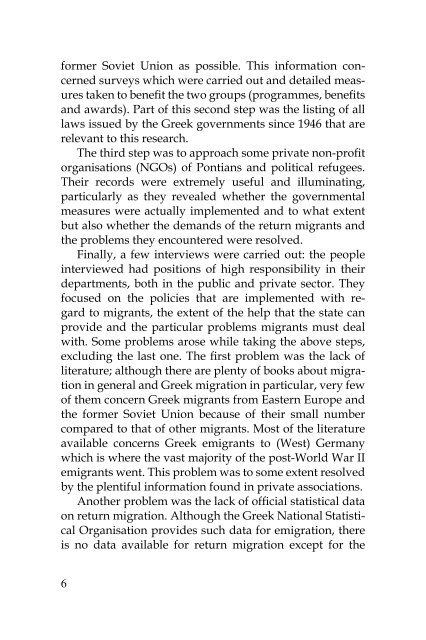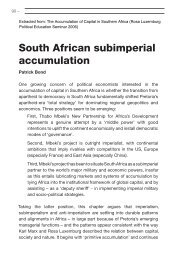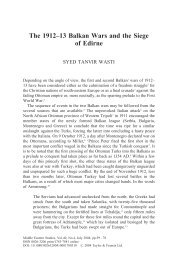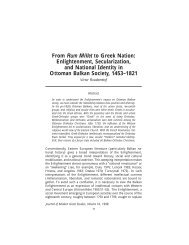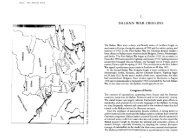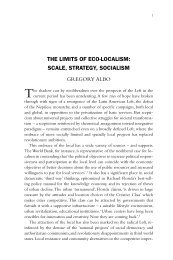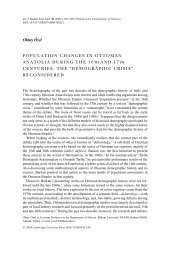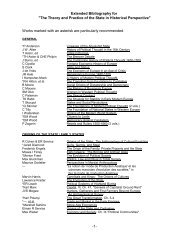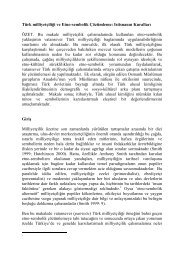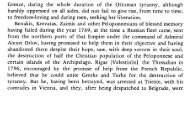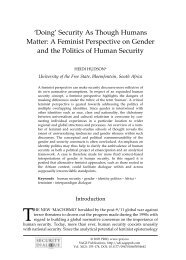The Greek diaspora in Eastern Europe and the Former Soviet Union
The Greek diaspora in Eastern Europe and the Former Soviet Union
The Greek diaspora in Eastern Europe and the Former Soviet Union
Create successful ePaper yourself
Turn your PDF publications into a flip-book with our unique Google optimized e-Paper software.
former <strong>Soviet</strong> <strong>Union</strong> as possible. This <strong>in</strong>formation concerned<br />
surveys which were carried out <strong>and</strong> detailed measures<br />
taken to benefit <strong>the</strong> two groups (programmes, benefits<br />
<strong>and</strong> awards). Part of this second step was <strong>the</strong> list<strong>in</strong>g of all<br />
laws issued by <strong>the</strong> <strong>Greek</strong> governments s<strong>in</strong>ce 1946 that are<br />
relevant to this research.<br />
<strong>The</strong> third step was to approach some private non-profit<br />
organisations (NGOs) of Pontians <strong>and</strong> political refugees.<br />
<strong>The</strong>ir records were extremely useful <strong>and</strong> illum<strong>in</strong>at<strong>in</strong>g,<br />
particularly as <strong>the</strong>y revealed whe<strong>the</strong>r <strong>the</strong> governmental<br />
measures were actually implemented <strong>and</strong> to what extent<br />
but also whe<strong>the</strong>r <strong>the</strong> dem<strong>and</strong>s of <strong>the</strong> return migrants <strong>and</strong><br />
<strong>the</strong> problems <strong>the</strong>y encountered were resolved.<br />
F<strong>in</strong>ally, a few <strong>in</strong>terviews were carried out: <strong>the</strong> people<br />
<strong>in</strong>terviewed had positions of high responsibility <strong>in</strong> <strong>the</strong>ir<br />
departments, both <strong>in</strong> <strong>the</strong> public <strong>and</strong> private sector. <strong>The</strong>y<br />
focused on <strong>the</strong> policies that are implemented with regard<br />
to migrants, <strong>the</strong> extent of <strong>the</strong> help that <strong>the</strong> state can<br />
provide <strong>and</strong> <strong>the</strong> particular problems migrants must deal<br />
with. Some problems arose while tak<strong>in</strong>g <strong>the</strong> above steps,<br />
exclud<strong>in</strong>g <strong>the</strong> last one. <strong>The</strong> first problem was <strong>the</strong> lack of<br />
literature; although <strong>the</strong>re are plenty of books about migration<br />
<strong>in</strong> general <strong>and</strong> <strong>Greek</strong> migration <strong>in</strong> particular, very few<br />
of <strong>the</strong>m concern <strong>Greek</strong> migrants from <strong>Eastern</strong> <strong>Europe</strong> <strong>and</strong><br />
<strong>the</strong> former <strong>Soviet</strong> <strong>Union</strong> because of <strong>the</strong>ir small number<br />
compared to that of o<strong>the</strong>r migrants. Most of <strong>the</strong> literature<br />
available concerns <strong>Greek</strong> emigrants to (West) Germany<br />
which is where <strong>the</strong> vast majority of <strong>the</strong> post-World War II<br />
emigrants went. This problem was to some extent resolved<br />
by <strong>the</strong> plentiful <strong>in</strong>formation found <strong>in</strong> private associations.<br />
Ano<strong>the</strong>r problem was <strong>the</strong> lack of official statistical data<br />
on return migration. Although <strong>the</strong> <strong>Greek</strong> National Statistical<br />
Organisation provides such data for emigration, <strong>the</strong>re<br />
is no data available for return migration except for <strong>the</strong><br />
years 1968–1977. All that is available is some official statistical<br />
data on <strong>the</strong> Pontian <strong>Greek</strong>s for <strong>the</strong> years 1986–1995<br />
supplied by EIYAPOE (a governmental organisation responsible<br />
for <strong>the</strong>se issues). <strong>The</strong> only way to f<strong>in</strong>d relevant<br />
<strong>in</strong>formation, particularly on <strong>the</strong> political refugees, was by<br />
ga<strong>the</strong>r<strong>in</strong>g <strong>the</strong> estimates of various associations <strong>and</strong> researchers<br />
<strong>and</strong> compar<strong>in</strong>g <strong>the</strong>m.<br />
Last but not least, <strong>the</strong> poor organisation of <strong>the</strong> public<br />
sector services for <strong>the</strong> <strong>Greek</strong>s abroad presented a problem:<br />
<strong>the</strong> relevant data was usually littered over several offices<br />
of a department or even over different departments. Also,<br />
some departments did not have <strong>the</strong> records <strong>the</strong>y were supposed<br />
to, <strong>and</strong> often denied responsibility on <strong>the</strong> matter. Although<br />
such bureaucratic problems are difficult to resolve,<br />
<strong>the</strong>y were overcome because of <strong>the</strong> friendly <strong>and</strong> helpful<br />
cooperation of <strong>the</strong> public servants contacted...<br />
Please refer to our forthcom<strong>in</strong>g publication “Migration <strong>and</strong> Political<br />
Intervention. Diasporas <strong>in</strong> Transition Countries” for <strong>the</strong><br />
complete text.<br />
<strong>The</strong> Pontian <strong>Greek</strong>s<br />
Historical retrospection<br />
<strong>The</strong> Pontians are descendants of <strong>the</strong> <strong>Greek</strong>s who, <strong>in</strong> <strong>the</strong><br />
8 th <strong>and</strong> 7 th centuries BC, created colonies <strong>in</strong> <strong>the</strong> Caucasus,<br />
<strong>the</strong> Crimea <strong>and</strong> on <strong>the</strong> coasts of <strong>the</strong> Black Sea; this area is<br />
called Eux<strong>in</strong>ous Pontos, <strong>and</strong> so those <strong>Greek</strong>s were called<br />
Pontians. This population <strong>in</strong>creased significantly dur<strong>in</strong>g<br />
<strong>the</strong> Ottoman Empire <strong>and</strong>, before World War I, <strong>the</strong>y numbered<br />
about 1.5 million 1 despite hav<strong>in</strong>g been persecuted by<br />
6 7


